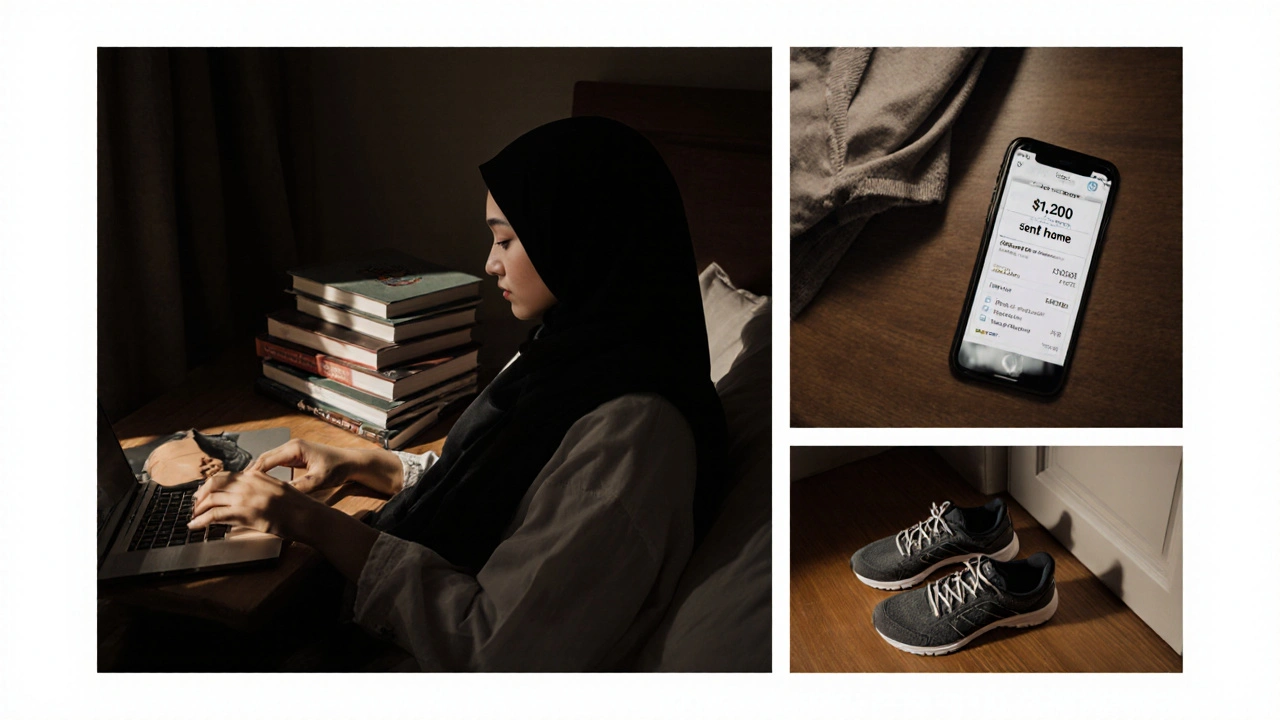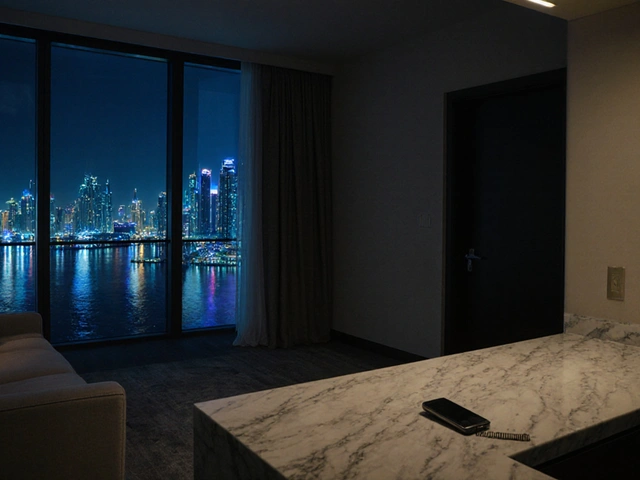
When people hear "Dubai girls," they often think of glamorous photos from Marina Beach, luxury cars, or viral videos from rooftop parties. But the truth is far more complex-and far more interesting. Dubai is home to thousands of women from over 200 nationalities. Their lives aren’t defined by stereotypes. They’re engineers, entrepreneurs, artists, mothers, athletes, and students. They work in tech startups, run family businesses, teach in public schools, and lead major corporations. The real story of Dubai girls isn’t about appearances. It’s about resilience, ambition, and navigating one of the most dynamic cities on earth.
Who Are Dubai Girls?
Dubai girls aren’t a single group. They’re Emirati women born and raised in the UAE, expats from India, the Philippines, Russia, Egypt, the UK, and beyond, and second-generation residents who grew up between cultures. Each has a different story. An Emirati woman might wear a abaya to work at a government ministry, then spend weekends hiking in Hatta with her friends. A Filipino nurse might live in a shared apartment in Deira, send money home to her family, and study English online after her shift. A Russian expat might run a boutique fitness studio in Business Bay. Their lives overlap in malls, gyms, and coffee shops-but their paths are shaped by nationality, religion, income, and personal choice.
According to Dubai Statistics Center data from 2024, women make up 52% of the city’s university graduates. That’s higher than the global average. More than 30% of Emirati women own their own businesses. And while media often focuses on luxury, the majority of women in Dubai work in healthcare, education, retail, and hospitality. They’re not just present-they’re leading.
Life in Dubai: Freedom With Limits
Dubai offers women more freedom than most Gulf cities. You can drive, work, travel alone, open a bank account, and sign leases without a male guardian’s permission. Emirati women have had the right to vote since 2006. In 2023, the UAE became the first Arab country to appoint a female Chief Justice. But freedom here isn’t the same as in New York or London. There are unwritten rules. Public displays of affection are frowned upon. Dressing too revealing in non-tourist areas can draw attention-sometimes unwanted. It’s not about law. It’s about social norms.
Many expat women learn quickly: what’s acceptable in a beach club isn’t okay at a local supermarket. Most women adapt without feeling restricted. They dress for the context. A hijabi mom might wear a designer coat over her abaya. A Western expat might swap shorts for capris when visiting a mosque or traditional market. It’s not about giving up identity. It’s about knowing where you are.
Work, Money, and Independence
Dubai is one of the few places in the region where women earn equal pay for equal work. The UAE government mandates gender pay equity in public sector jobs. Private companies follow suit to attract talent. Salaries for women in finance, IT, and healthcare are among the highest in the Middle East. Many women here earn more than their male counterparts in their home countries.
Independent living is common. Thousands of women rent apartments alone in areas like JLT, Dubai Hills, and Al Barsha. They don’t need permission from family to move out. Many support parents back home. One Indian nurse in Al Quoz told me she sends $1,200 a month to her sister’s education fund. A Jordanian pharmacist in Downtown Dubai saved enough in three years to buy a condo in Amman. Financial independence isn’t rare here-it’s expected.

Education: The Real Gateway
Education is the biggest driver of opportunity for women in Dubai. The city has over 50 international schools offering IB, British, and American curricula. Universities like American University of Sharjah and Dubai Women’s College have graduation rates above 90% for female students. Many girls start preparing for university in their early teens. They take SAT prep courses, attend STEM camps, and join debate clubs.
There’s a quiet revolution happening: Emirati girls are choosing engineering and computer science over traditional fields like nursing or teaching. In 2024, 45% of engineering graduates at Khalifa University were women. That number was 18% in 2015. Change isn’t loud. It’s in the classrooms, labs, and boardrooms.
What No One Tells You
Behind the Instagram filters, life isn’t always easy. Many women face loneliness. Expats miss family holidays. Emirati women sometimes feel caught between tradition and modernity. One 28-year-old Emirati woman, who works in fintech, told me: "I love my job. But when I want to go out with friends on a Friday night, I have to choose between being seen as "too modern" or staying home. There’s pressure to be both perfect and invisible."
There’s also the issue of visibility. Women of color, especially African and South Asian expats, often report being ignored in upscale areas or treated as service staff even when they’re clearly professionals. A Nigerian doctor in Dubai said she once had to show her ID three times at a hospital cafeteria because the staff assumed she was a cleaner.
And yes, there are still dangerous myths. Some believe all foreign women in Dubai are here for escort work. That’s false. Less than 0.1% of the female population is involved in sex work, according to UAE government reports. Most women are here to build careers, raise families, or study. The noise around "Dubai girls" often drowns out the real stories.
Where to See Real Dubai Girls
If you want to meet the real women of Dubai, skip the beach clubs and go where they live. Visit the Dubai Women’s Association in Al Quoz-it offers free English classes, legal advice, and career workshops. Walk through the Al Fahidi Historical District on a weekend morning. You’ll see Emirati women buying spices, chatting with neighbors, and picking up their kids from school. Join a book club at the Dubai Public Library. Attend a women-led startup pitch night at Dubai Future Foundation. These are the spaces where real connections happen.
There’s also the Dubai Women’s Marathon, held every February. Over 12,000 women run it every year-from elderly Emiratis in abayas to young expats in running gear. It’s not a spectacle. It’s a statement.

Myths vs. Reality
- Myth: All Dubai girls are rich. Reality: Most work hourly jobs. The average monthly salary for expat women is $2,100-enough to live, but not to flaunt.
- Myth: Women are oppressed. Reality: Women hold 27% of ministerial positions in the UAE government-higher than the U.S. Congress.
- Myth: They’re all into parties. Reality: Over 60% of Emirati women say they prefer quiet weekends at home with family.
- Myth: They’re all the same. Reality: A Filipina domestic worker, a Saudi entrepreneur, and a Canadian teacher have nothing in common except the city they call home.
What’s Changing
The next generation is different. Young Emirati girls are growing up with smartphones, global media, and access to mentors. They’re not waiting for permission. They’re launching apps, writing novels, and starting YouTube channels about mental health. One 17-year-old from Sharjah created a mental health app for Arabic-speaking teens. It’s used by over 40,000 people.
The government is responding. New laws protect women from workplace harassment. Maternity leave is now 6 months with full pay. Childcare centers are opening in every major business district. The message is clear: women aren’t just part of Dubai’s future. They’re building it.
Final Thought
Dubai girls aren’t a trend. They’re not a photo op. They’re not a stereotype. They’re real people-working, learning, loving, and leading. If you only see the glitz, you miss the grit. If you only hear the noise, you miss the silence. The quiet strength of these women isn’t loud. But it’s powerful. And it’s changing the city-one day, one decision, one career at a time.
Are Dubai girls allowed to work?
Yes. Women in Dubai have full legal rights to work in any field, including government, tech, finance, and military roles. The UAE government mandates equal pay for equal work, and women hold leadership positions across all sectors. Over 30% of Emirati women own businesses, and women make up more than half of university graduates.
Can foreign women live alone in Dubai?
Absolutely. Thousands of expat women live alone in apartments across Dubai-no male guardian required. Landlords cannot refuse a rental based on gender. Many women rent in areas like Jumeirah, Business Bay, and Dubai Marina. The city is considered one of the safest in the world for solo female residents.
Do Dubai girls wear hijab?
Some do, some don’t. It’s a personal choice. Emirati women often wear abayas or headscarves as part of cultural tradition, but many dress in Western styles. Expats wear whatever they’re comfortable with. There’s no law forcing women to cover. You’ll see everything from full hijabs to tank tops in malls-depending on the area and context.
Is Dubai safe for women?
Yes. Dubai consistently ranks as one of the safest cities globally for women. Crime rates are extremely low. Police respond quickly to reports of harassment. Women can walk alone at night in most areas without fear. Public transportation is well-lit and monitored. The city has dedicated women-only sections on metro trains and buses for added comfort.
Are there opportunities for women in tech in Dubai?
Yes. Dubai has launched multiple initiatives to boost women in STEM. Programs like "Dubai Women in Tech" and "She Leads Dubai" offer mentorship, funding, and networking. Women hold key roles at companies like Emirates NBD, DP World, and the Dubai Future Foundation. In 2024, over 45% of engineering graduates at Khalifa University were women.
Do Dubai girls date openly?
Dating exists, but it’s private. Public displays of affection are illegal and socially frowned upon. Most relationships-whether between Emiratis, expats, or mixed couples-happen behind closed doors. Many couples meet through work, university, or mutual friends. Apps like Bumble and Tinder are used, but discreetly. Social norms still influence behavior, even among younger generations.
What’s the biggest challenge for women in Dubai?
Balancing tradition with modernity. Many women, especially Emiratis, face pressure to conform to family expectations while pursuing careers or personal goals. Expats sometimes struggle with isolation or cultural misunderstandings. But the biggest challenge isn’t law-it’s social perception. Breaking stereotypes takes time, but progress is steady.


